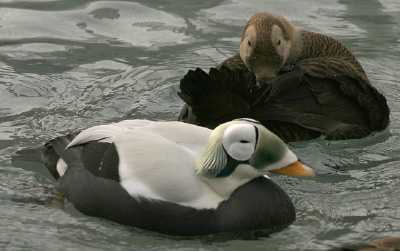 Spectacled Eider Spectacled EiderSomateria
fischeri
Description
The spectacled eider differs
from other eiders in that its feathers extend
down to the nostrils on the bill, which is bright
orange on males and blue-gray on females. Males
have a black chest and pale green head, but are
best distinguished by the white patches around
their eyes, which are encircled by black feathers
to give the appearance of spectacles. Females are
brown with black streaks and bars of brown, with
light brown patches around the eyes.
Distribution and
Habitat
Spectacled eiders are found
along the west coast of Alaska, from Point Barrow
to the Lower Kuskokwim River. They breed on
lowland tundra near shores, lakes, and deltas
that has sufficient high grass in which to build
their nests.
Reproduction
Pair bonds form at the
beginning of each breeding season, and are broken
as soon as the season is over.
The nest is built in grass
flats or on the edges of tundra ponds. One egg is
laid every other day, up to an average of 4 or 5
total per clutch. Incubation takes about 24 days,
and chicks are able to fly after about 53 days.
Diet
The majority of the spectacled
eider's diet consists of mollusks, but they also
feed on terrestrial and freshwater plant
material. On water it is more of a dabbler than a
diver.
Habits and Behaviors
Spectacled eiders are much more
social during the breeding season that at other
times during the year.
Scientific
Classification
phylum Chordata
subphylum Vertebrata
class Aves
order Anseriformes
family Anatidae
subfamily Anatinae
genus & species Somateria fischeri

Animal Diversity Web http://animaldiversity.org/accounts/Somateria_fischeri/
Questions or comments about
this page?
|



